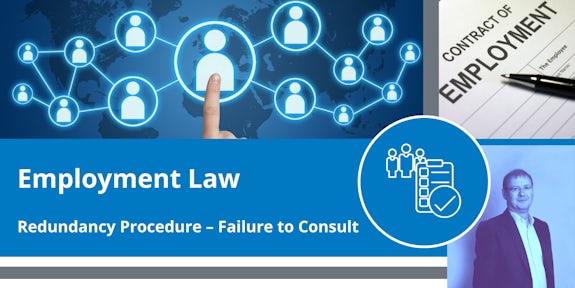Background
In a recent case (Joseph de Bank Haycocks v ADP RPO UK Limited) the Employment Appeal Tribunal considered whether a redundancy dismissal was unfair in circumstances where the employer failed to consult with the workforce, in relation to redundancy proposals, at the “formative” stage of the process.
Facts
The facts of the case are that the employer (“ADP”) was the UK subsidiary of a US company. The function of ADP was to provide outsourced recruitment services to client companies.
One client company of ADP was Goldman Sachs and 16 employees were employed by ADP solely to provide recruitment services for the Goldman Sachs contract.
At the time of the global pandemic in 2020, the requirement for ADP to recruit new employees for Goldman Sachs reduced by 50% and, as a direct consequence, ADP took the decision to reduce headcount in this part of the business.
The UK manager was instructed to conduct the scoring exercise using a standard matrix of criteria (comprising 17 subjective factors) provided by the US company. The UK manager carried out a pooling and scoring exercise at the beginning of June 2020 prior to consulting the relevant employees – the claimant scored lowest of the 16 employees in the pool.
A decision was taken by ADP on 18th June to reduce the department from 16 to 14 employees and a timetable for the redundancy process was produced on the following day (19th June). The first consultation meeting with the claimant took place on 30th June. The second consultation meeting was held on 8th July to discuss the matter further and consider any alternatives to redundancy. The final consultation meeting took place on 14th July and the claimant was given a letter of dismissal
The claimant appealed against dismissal on the basis that he had not been shown his scores during the process and had not been shown the comparative scores of others in the pool. During the internal appeal process the claimant was provided with his own scores but not the scores of others in the pool. The appeal was rejected by the company and the claimant raised an unfair dismissal claim.
Decision
The EAT reviewed relevant case law and noted that the nature of employment had changed radically since the 1980s when many of the leading cases were decided. The EAT expressed the view that the main elements of the change were the decrease in trade union membership in the period and a growth in employment where there is an international element in the corporate structure.
The EAT held that in this case there was a clear absence of consultation at the formative stage. The EAT stated that there was “nothing in the Employment Tribunal judgment” which indicated that there were good reasons not to discuss the redundancy at what is described by the EAT as the “workforce level of consultation”.
The EAT decided that, as a consequence, there was never an opportunity for employees to discuss the prospects of a different approach to any aspect of the redundancy process chosen by the employer and that the absence of meaningful consultation at a formative stage, when employees have the potential to impact on the decision, is indicative of an unfair process.
The EAT stated that, without an explanation as to why omitting the workforce level of consultation would be reasonable in these particular circumstances, the ET had not provided sufficient reasons to explain its decision.
The EAT noted that factors which indicated that the process was unfair included (1) that the numbers to be dismissed was not settled until a major part of the process of selection had been concluded shows that there was no pressure of time (2) the claimant (and the wider workforce) were not consulted about redundancy proposals before pooling and scoring took place (3) the criteria for selection, and the Claimant’s own scores, were not provided to him before his dismissal – although it was provided on appeal.
The EAT held that whilst (an) appeal could correct any missing aspect of the individual consultation process (such as the provision of the Claimant’s scores) it could not repair the gap of consultation in the formative stage.
EAT Guidelines
The EAT, set out the following guiding principles for fair redundancy consultation:
• The employer will normally warn and consult either the employees affected or their representative.
• A fair consultation occurs when proposals are at a formative stage, and where the employee is given adequate information and adequate time to respond (along with conscientious consideration being given to that response).
• In consultation, the purpose is to avoid dismissal or reduce the impact of redundancies.
• A redundancy process must be viewed as a whole and an appeal may correct an earlier failing.
• It is a question of fact and degree as to whether consultation is adequate and it is not automatically unfair that there is a lack of consultation in a particular respect.
• Any particular aspect of consultation, such as the provision of scoring, is not essential to a fair process.
• The use of a scoring system does not make a process fair automatically.
• Whether it is reasonable to show an employee the scores of others in a pool will be case-specific.
Comment for Employers
The commercial reality is that many employers take an initial management level decision to reduce headcount, consider options for reduction and decide at that stage on a strategy as to numbers (and often the identity of employees) to be selected before consulting with employees.
This is a noteworthy case in the sense that the EAT guidelines set out a framework for employers to follow. In order to avoid falling foul of an unfair dismissal claim or claims we would recommend that employers take legal advice prior to commencing a redundancy procedure.
If you would like to discuss the information outlined in this blog post, please get in touch with Stuart Robertson by email or by phone at +(0) 7793 821 523.








